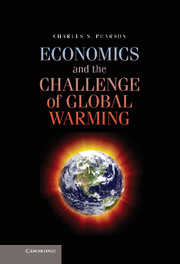Book contents
- Frontmatter
- Contents
- Acknowledgments
- Introduction and a Road Map
- 1 Climate Change
- 2 The Role of Benefit Cost in Climate Policy
- 3 Discounting and Social Weighting (Aggregating over Time and Space)
- 4 Empirical Estimates
- 5 Strategic Responses
- 6 Targets and Tools
- 7 Trade and Global Warming
- 8 The Challenge of International Cooperation
- 9 Beyond Kyoto
- 10 A Summing-Up
- Index
- References
8 - The Challenge of International Cooperation
Published online by Cambridge University Press: 05 June 2012
- Frontmatter
- Contents
- Acknowledgments
- Introduction and a Road Map
- 1 Climate Change
- 2 The Role of Benefit Cost in Climate Policy
- 3 Discounting and Social Weighting (Aggregating over Time and Space)
- 4 Empirical Estimates
- 5 Strategic Responses
- 6 Targets and Tools
- 7 Trade and Global Warming
- 8 The Challenge of International Cooperation
- 9 Beyond Kyoto
- 10 A Summing-Up
- Index
- References
Summary
Introduction
The laws of physics give de facto property rights to greenhouse gas emitters. The doctrine of state sovereignty leaves control up to individual countries. Although the elegant Coase Theorem suggests that this does not have to be a barrier to negotiating efficient levels of mitigation, the international market for cooperation appears dysfunctional. This chapter provides some partial answers as to why this is so. The subsequent chapter assesses current climate negotiations.
Climate change is a global “public bad” and preventing climate change is a global “public good.” We start with a brief conceptual discussion of these terms. This leads to the conclusion that coordinated international action, presumably through a post-Kyoto international environmental agreement (IEA), is needed. But it also highlights the serious difficulties involved. The next section considers the objectives, timing, and especially the participation in such an agreement. This may be thought of as the willingness to cooperate. A combination of carrots and sticks may encourage that willingness. The necessity for cooperation arises from the need to minimize the cost of greenhouse gas abatement and the rapidly closing window for aggressive climate policy. The case for inclusion of medium and large developing countries (and the United States) in mitigation efforts is compelling. Even with carrots and sticks, however, there appears to be a mismatch between the need for and the willingness to cooperate.
- Type
- Chapter
- Information
- Economics and the Challenge of Global Warming , pp. 171 - 205Publisher: Cambridge University PressPrint publication year: 2011



